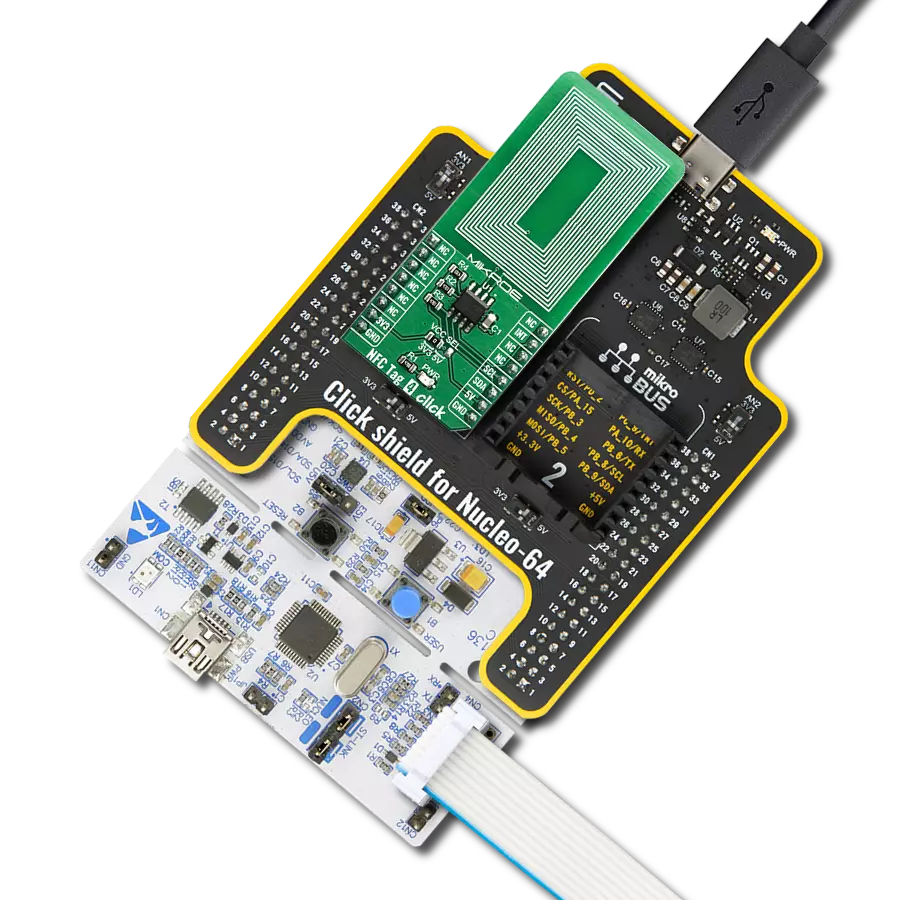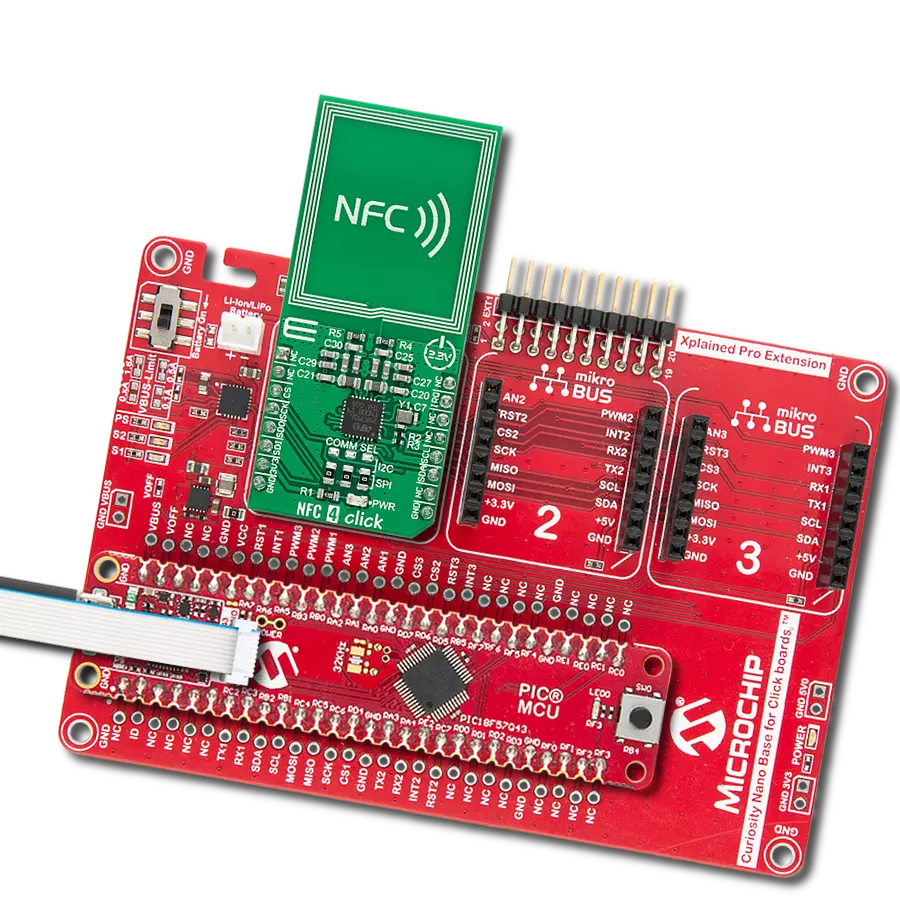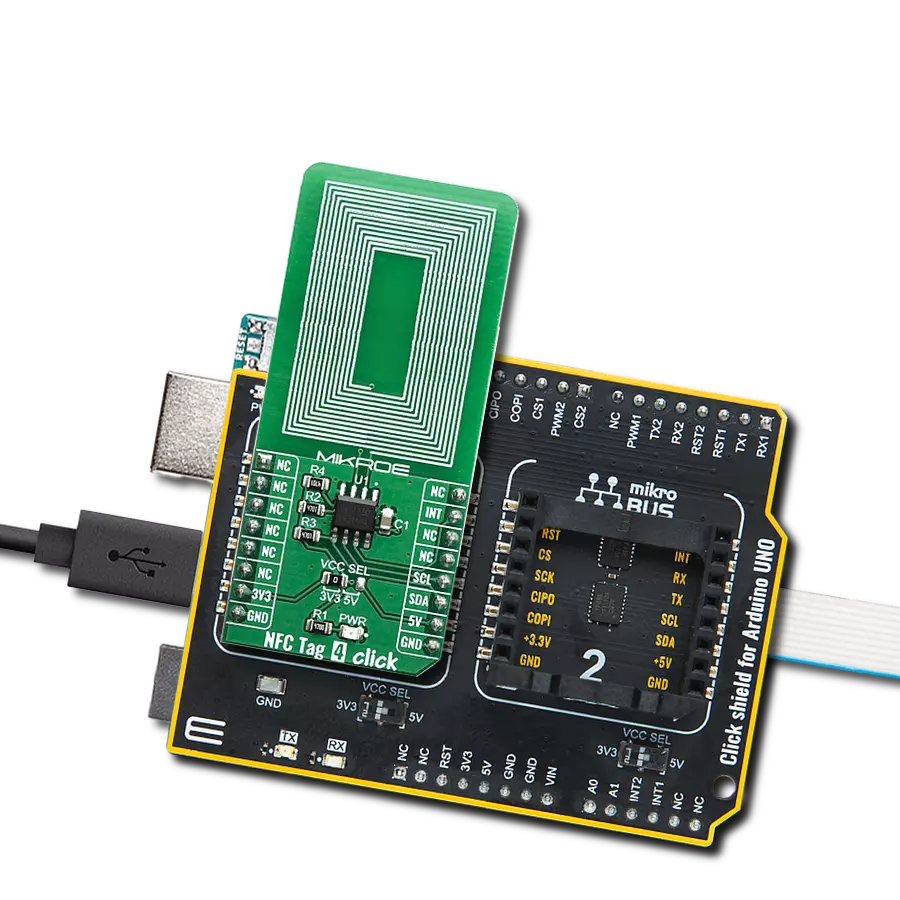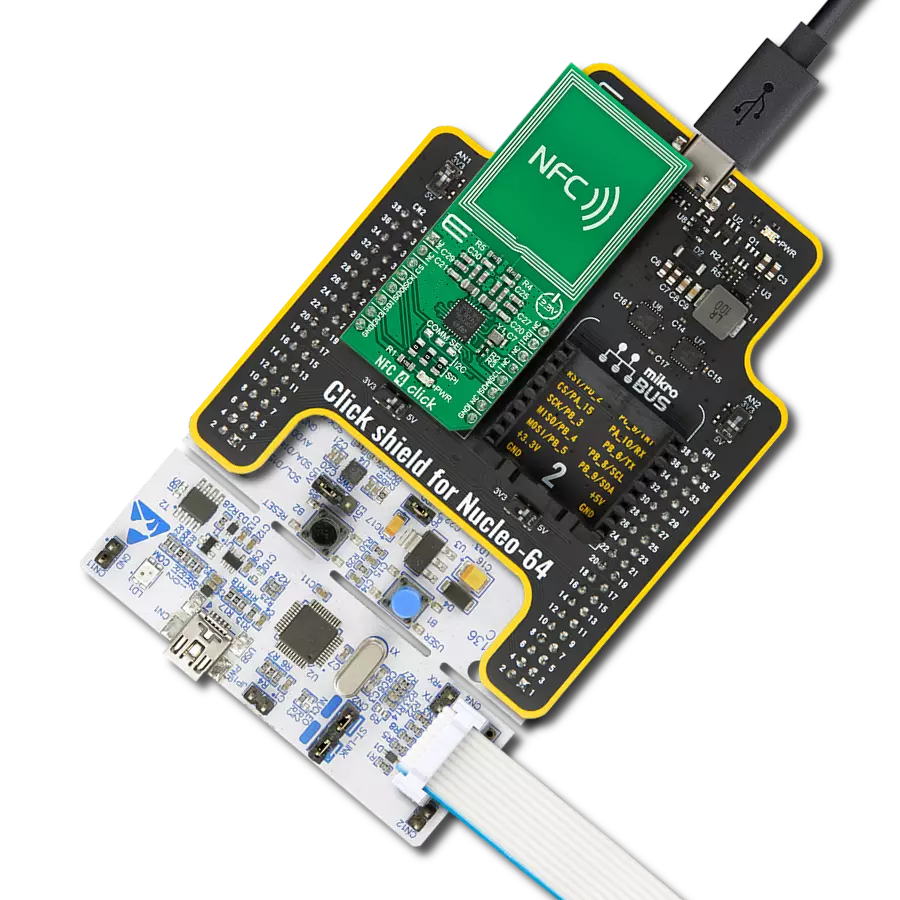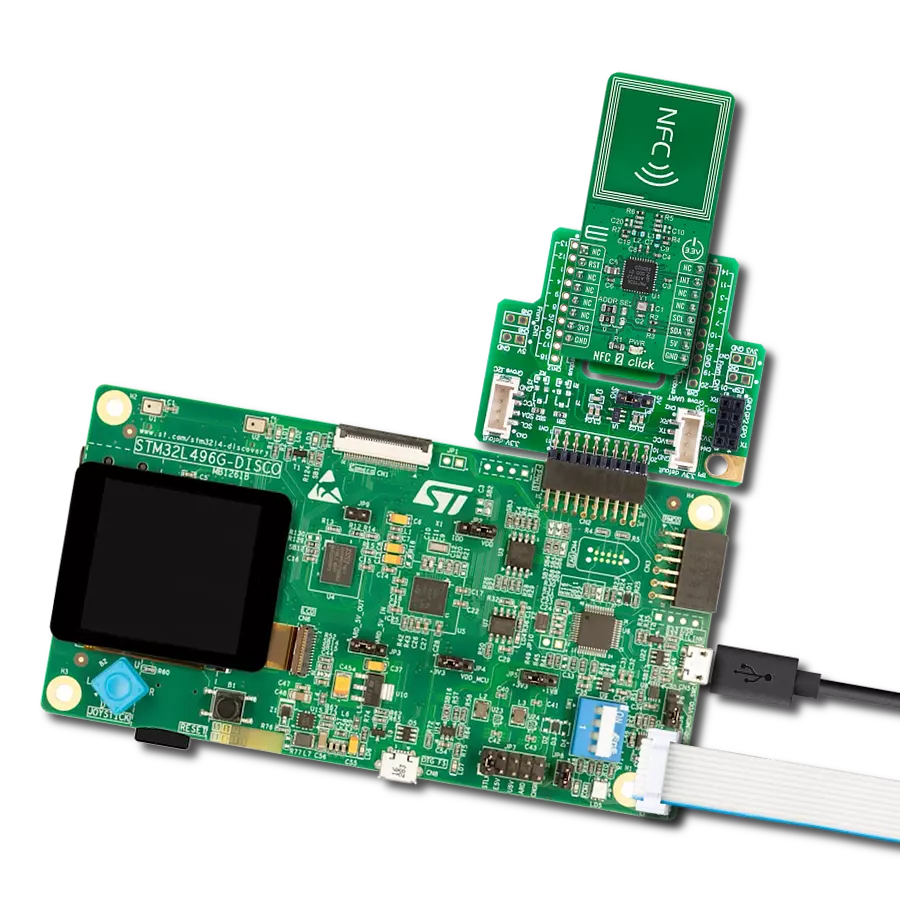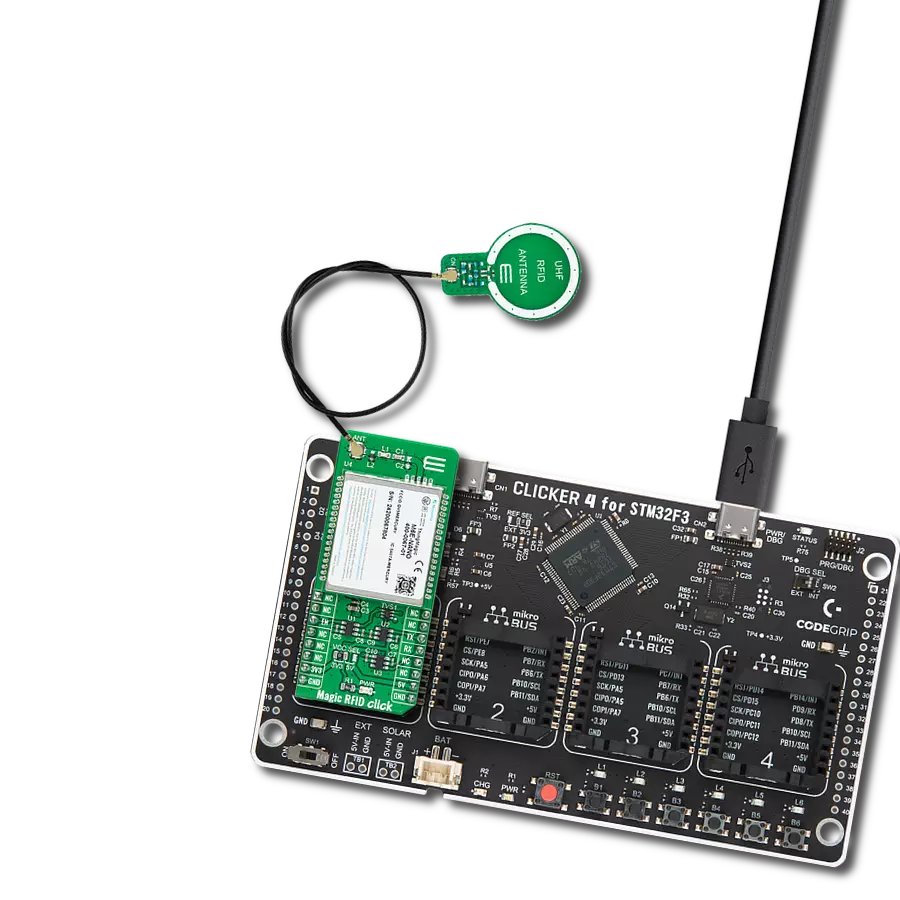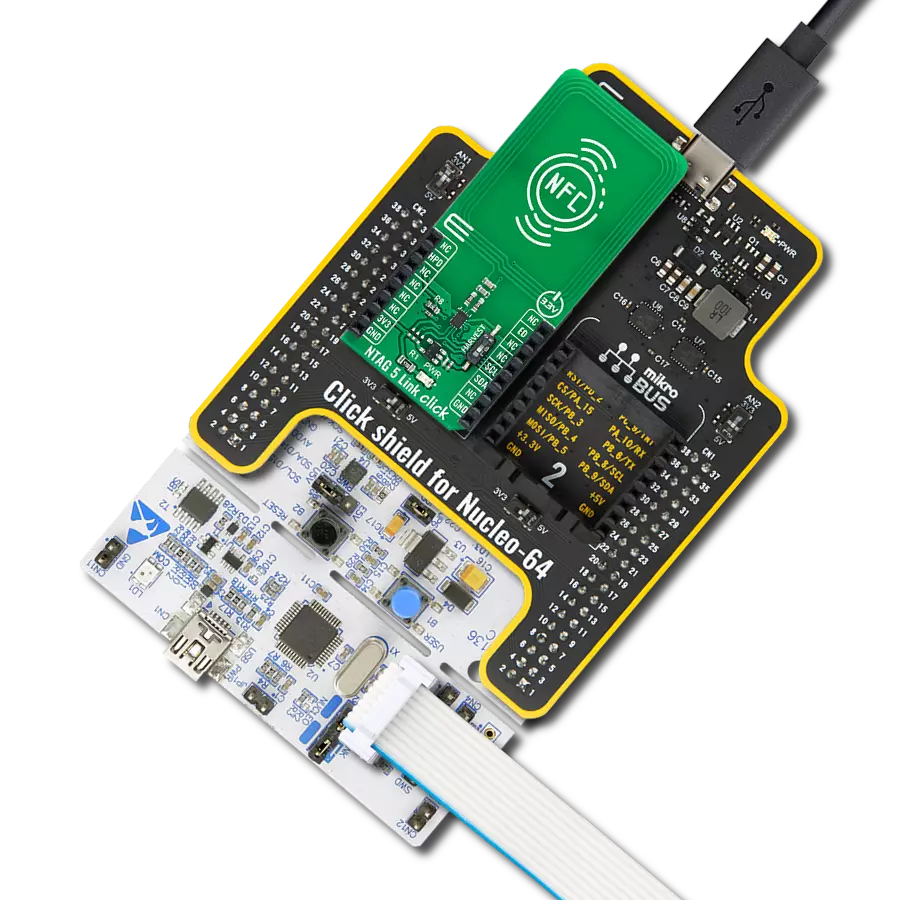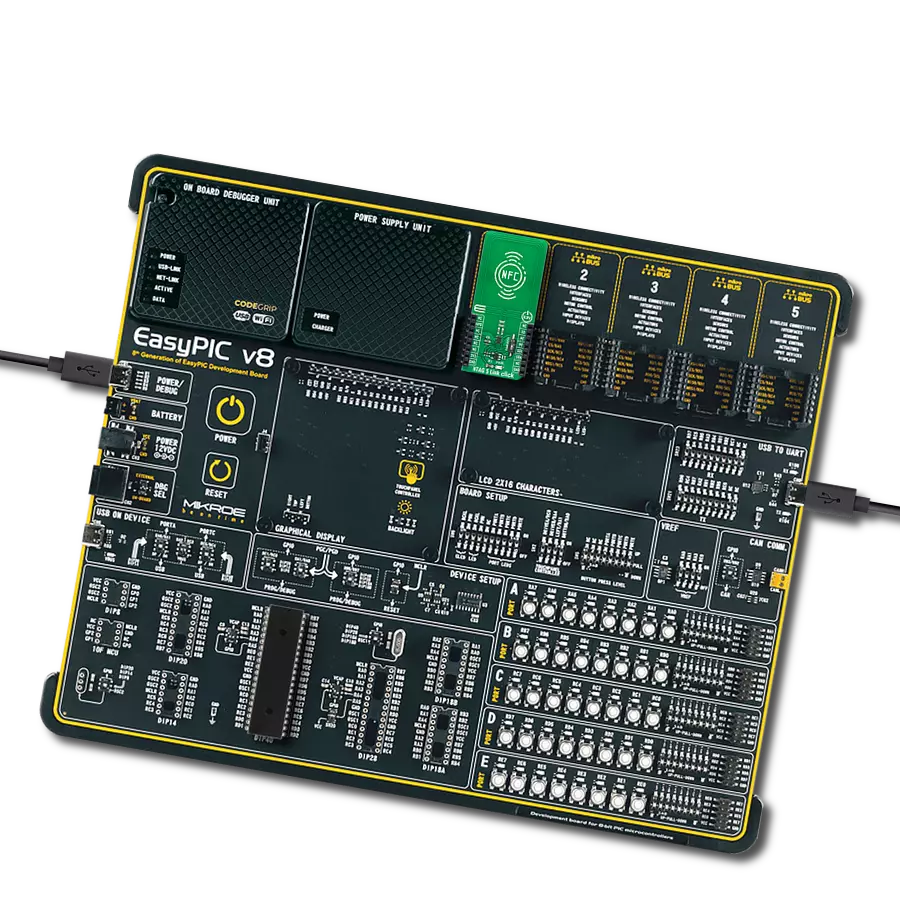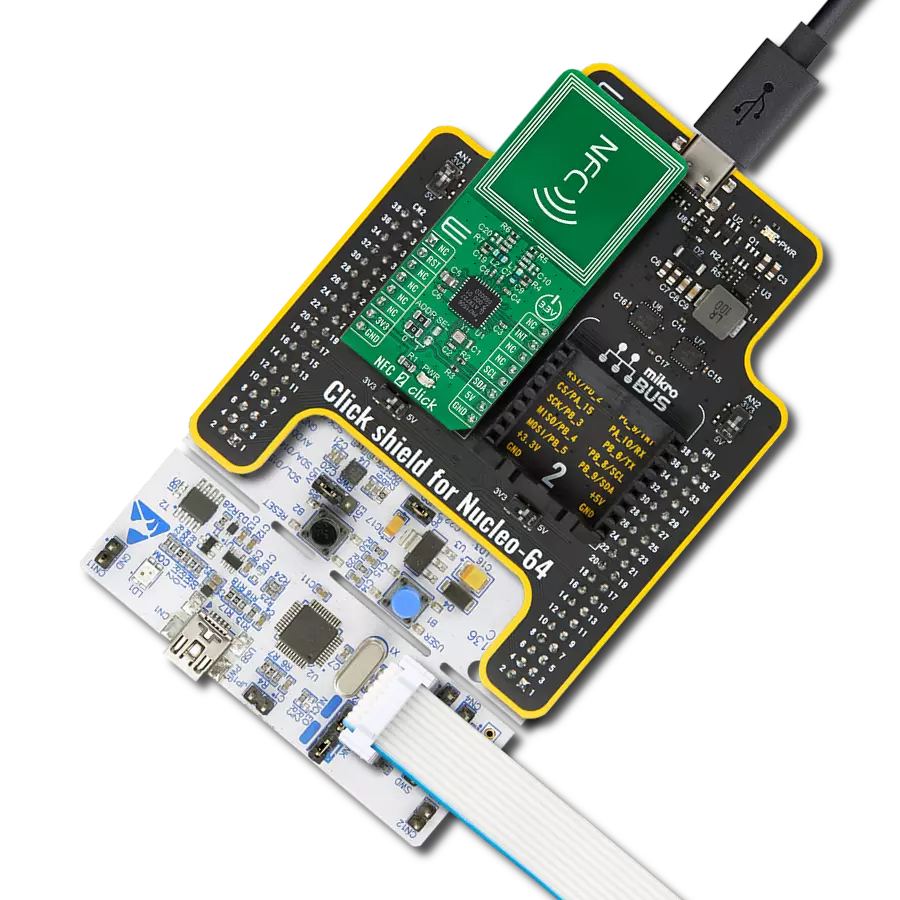NFC functionality with high sensitivity and low power consumption perfect for mobile devices and smart home gateways
A
A
Hardware Overview
How does it work?
NFC 7 Click is based on the PN7160, a Near Field Communication (NFC) controller from NXP. This versatile NFC solution is designed to comply with NFC Forum and NCI 2.0 standards, offering robust integration for a wide range of NFC-enabled applications. This version of NFC 7 Click communicates with the host MCU exclusively through an I2C interface (PN7160A1HN/C100) and provides an optimized architecture for low-power consumption. The PN7160 features multiple power-saving modes, including a Hard Power-Down state, a firmware-activated Standby state, and a low-power polling loop for automatic device discovery to ensure efficient energy use across various operating scenarios. NFC 7 Click is particularly well-suited for portable and low-power applications where reliable NFC functionality is essential, including mobile devices, wearable technology, personal digital assistants, consumer electronics, and smart home gateways. At its core, the PN7160 incorporates a new generation RF contactless front-end, supporting transmission modes compliant with NFCIP-1 and NFCIP-2, as well as ISO/IEC 14443, ISO/IEC 15693, MIFARE, and FeliCa standards. This advanced design significantly enhances performance by delivering
higher sensitivity and active load modulation capabilities. These improvements allow NFC 7 Click to maintain reliable communication even with small antenna designs, such as the one integrated into this board. The PN7160 introduces Enhanced Dynamic Load Modulation Amplitude (DLMA), which adapts the modulation amplitude dynamically based on external field strength. This feature extends communication distances in card emulation mode, ensuring independent phase adjustments for Type A, B, and F communication with 5° precision. Additionally, dynamic power control enables the board to operate at maximum power in reader mode without surpassing standard-defined limits, even at zero distance. In standalone card functionality, the PN7160 can operate autonomously once configured by the host MCU, allowing Passive Integrated Circuit Card (PICC) features to function without requiring the host to remain powered on. This makes NFC 7 Click an ideal solution for energy-efficient and always-on NFC applications. As mentioned, NFC 7 Click uses a standard 2-wire I2C communication protocol, allowing the host MCU to control the PN7160 with clock frequencies up to 3.4MHz in High-Speed mode. In this I2C version of the board, the ADDR
SEL jumpers must be populated to select the desired I2C address, ensuring proper communication with the host device. Additionally, the back of the board features a set of resistors that need to be populated depending on the board version; in this case, only the resistors in the I2C positions are populated, as required for I2C functionality. Besides the interface pins, NFC 7 Click incorporates the VEN pin, which places the device into Hard Power-Down mode to conserve energy when not in use. It also uses the IRQ pin to handle interrupt requests, providing a mechanism for the host MCU to respond promptly to events such as tag detection, completed operations, or errors, enhancing the overall responsiveness and efficiency of NFC-based applications. This Click board™ can operate with either 3.3V or 5V logic voltage levels selected via the VCC SEL jumper. This way, both 3.3V and 5V capable MCUs can use the communication lines properly. Also, this Click board™ comes equipped with a library containing easy-to-use functions and an example code that can be used as a reference for further development.
Features overview
Development board
PIC18F57Q43 Curiosity Nano evaluation kit is a cutting-edge hardware platform designed to evaluate microcontrollers within the PIC18-Q43 family. Central to its design is the inclusion of the powerful PIC18F57Q43 microcontroller (MCU), offering advanced functionalities and robust performance. Key features of this evaluation kit include a yellow user LED and a responsive
mechanical user switch, providing seamless interaction and testing. The provision for a 32.768kHz crystal footprint ensures precision timing capabilities. With an onboard debugger boasting a green power and status LED, programming and debugging become intuitive and efficient. Further enhancing its utility is the Virtual serial port (CDC) and a debug GPIO channel (DGI
GPIO), offering extensive connectivity options. Powered via USB, this kit boasts an adjustable target voltage feature facilitated by the MIC5353 LDO regulator, ensuring stable operation with an output voltage ranging from 1.8V to 5.1V, with a maximum output current of 500mA, subject to ambient temperature and voltage constraints.
Microcontroller Overview
MCU Card / MCU
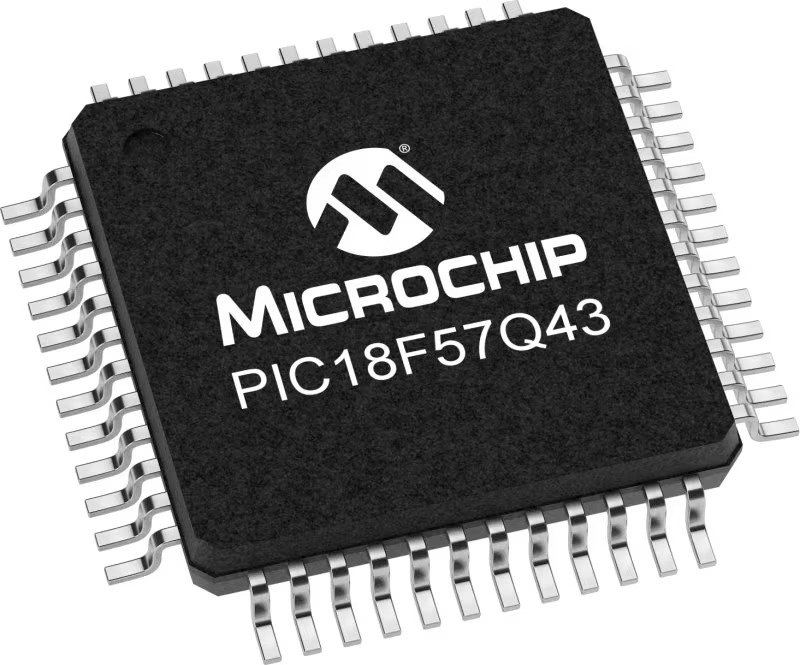
Architecture
PIC
MCU Memory (KB)
128
Silicon Vendor
Microchip
Pin count
48
RAM (Bytes)
8196
You complete me!
Accessories
Curiosity Nano Base for Click boards is a versatile hardware extension platform created to streamline the integration between Curiosity Nano kits and extension boards, tailored explicitly for the mikroBUS™-standardized Click boards and Xplained Pro extension boards. This innovative base board (shield) offers seamless connectivity and expansion possibilities, simplifying experimentation and development. Key features include USB power compatibility from the Curiosity Nano kit, alongside an alternative external power input option for enhanced flexibility. The onboard Li-Ion/LiPo charger and management circuit ensure smooth operation for battery-powered applications, simplifying usage and management. Moreover, the base incorporates a fixed 3.3V PSU dedicated to target and mikroBUS™ power rails, alongside a fixed 5.0V boost converter catering to 5V power rails of mikroBUS™ sockets, providing stable power delivery for various connected devices.
RFID tag operating at 13.56MHz adheres to the ISO14443-A standard, ensuring high-frequency communication. This proximity card technology, often exemplified by MIFARE cards, facilitates secure and contactless interactions in applications like access control, public transport, and payment systems. The ISO14443-A standard defines the communication protocol, incorporating anti-collision mechanisms for simultaneous card handling. These RFID tags possess variable memory capacities, ranging from a few bytes to kilobytes, catering to diverse application needs. Ensuring data security, the standard integrates features such as encryption and authentication. These tags, exemplified by MIFARE technology, are widely used for their efficiency and are vital in enhancing convenience and security in diverse identification and access scenarios.
Used MCU Pins
mikroBUS™ mapper
Take a closer look
Click board™ Schematic

Step by step
Project assembly
Track your results in real time
Application Output
1. Application Output - In Debug mode, the 'Application Output' window enables real-time data monitoring, offering direct insight into execution results. Ensure proper data display by configuring the environment correctly using the provided tutorial.

2. UART Terminal - Use the UART Terminal to monitor data transmission via a USB to UART converter, allowing direct communication between the Click board™ and your development system. Configure the baud rate and other serial settings according to your project's requirements to ensure proper functionality. For step-by-step setup instructions, refer to the provided tutorial.
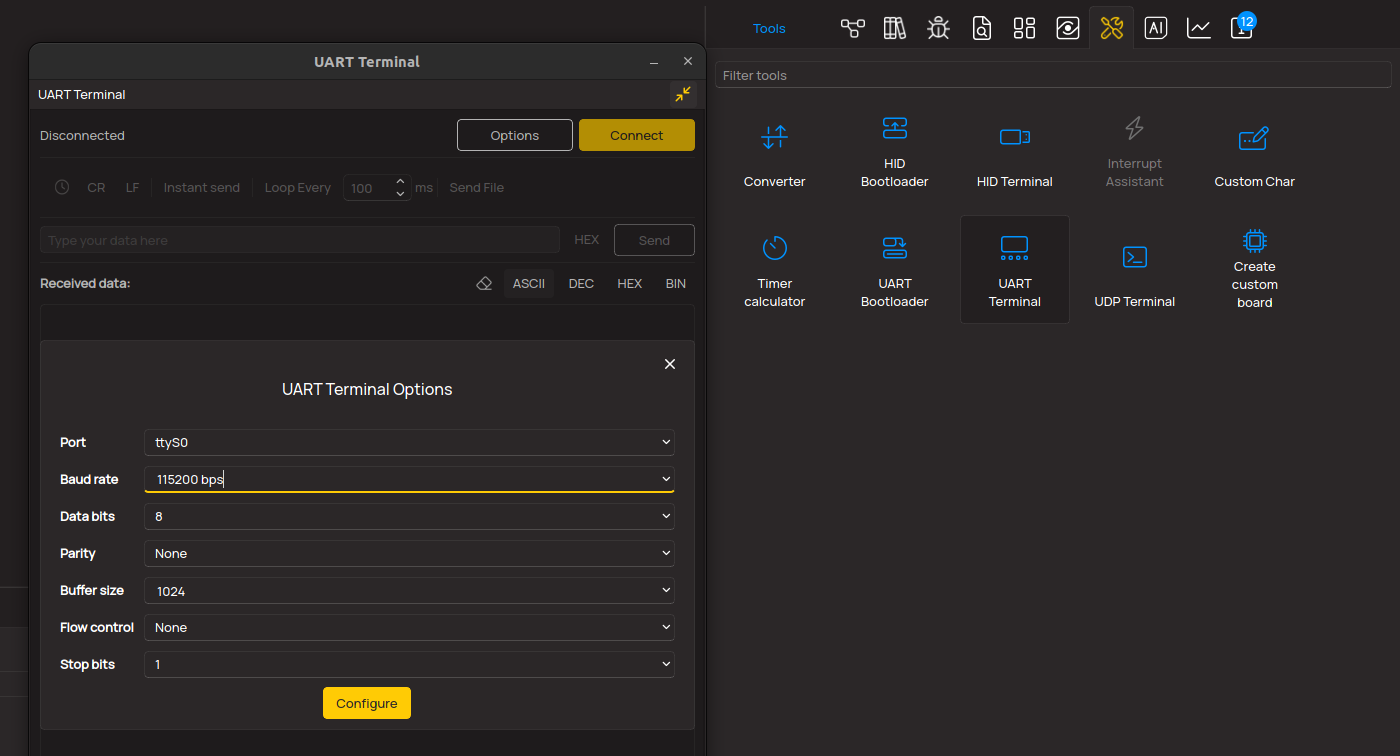
3. Plot Output - The Plot feature offers a powerful way to visualize real-time sensor data, enabling trend analysis, debugging, and comparison of multiple data points. To set it up correctly, follow the provided tutorial, which includes a step-by-step example of using the Plot feature to display Click board™ readings. To use the Plot feature in your code, use the function: plot(*insert_graph_name*, variable_name);. This is a general format, and it is up to the user to replace 'insert_graph_name' with the actual graph name and 'variable_name' with the parameter to be displayed.
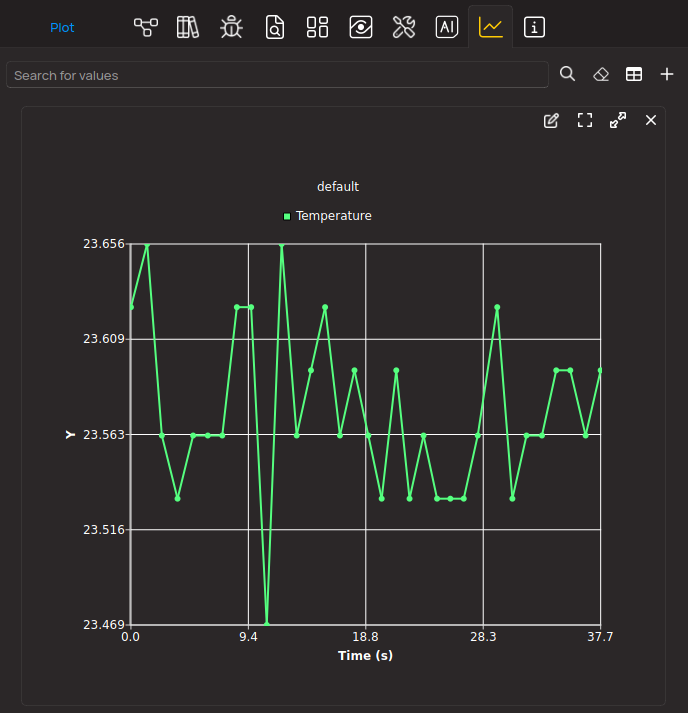
Software Support
Library Description
This library contains API for NFC 7 Click (I2C) driver.
Key functions:
nfc7i2c_wait_discovery- This function waits until remote NFC device is discovered.nfc7i2c_presence_check- This function waits until the discovered target device is removed.nfc7i2c_stop_discovery- This function stops the RF discovery process.
Open Source
Code example
The complete application code and a ready-to-use project are available through the NECTO Studio Package Manager for direct installation in the NECTO Studio. The application code can also be found on the MIKROE GitHub account.
/*!
* @file main.c
* @brief NFC 7 I2C Click example
*
* # Description
* This example demonstrates the use of NFC 7 I2C Click board by handling the detection
* and processing of various NFC technologies and protocols, and ensuring the application
* can respond to different NFC card types (A,B,F,V).
*
* The demo application is composed of two sections :
*
* ## Application Init
* Initializes the driver and logger, performs the Click default configuration and
* reads the device firmware version.
*
* ## Application Task
* Waits for an NFC device to be discovered, checks if it supports a known NFC technology,
* and then handles the device based on its protocol. The application continues processing
* the device (reading and writing information) and waits until the card is removed.
* Once the card is removed, the discovery process is restarted to detect a new NFC device.
*
* @author Stefan Filipovic
*
*/
#include "board.h"
#include "log.h"
#include "nfc7i2c.h"
static nfc7i2c_t nfc7i2c;
static log_t logger;
/**
* @brief NFC 7 I2C handle ISO14443-3A function.
* @details This function handles discovered ISO14443-3A / Type 2 Tag (T2T) card by performing
* read/write data to memory block 32.
* @param[in] ctx : Click context object.
* See #nfc7i2c_t object definition for detailed explanation.
* @return None.
* @note None.
*/
static void nfc7i2c_handle_iso14443_3a ( nfc7i2c_t *ctx );
/**
* @brief NFC 7 I2C handle ISO14443-4 function.
* @details This function handles discovered ISO14443-4 (ISO-DEP) card by selecting the PPSE
* (Paypass Payment System Environment) application.
* @param[in] ctx : Click context object.
* See #nfc7i2c_t object definition for detailed explanation.
* @return None.
* @note None.
*/
static void nfc7i2c_handle_iso14443_4 ( nfc7i2c_t *ctx );
/**
* @brief NFC 7 I2C handle ISO15693 function.
* @details This function handles discovered ISO15693 card by performing read/write data
* to memory block 32.
* @param[in] ctx : Click context object.
* See #nfc7i2c_t object definition for detailed explanation.
* @return None.
* @note None.
*/
static void nfc7i2c_handle_iso15693 ( nfc7i2c_t *ctx );
/**
* @brief NFC 7 I2C handle mifare function.
* @details This function handles discovered MIFARE card by performing read/write data
* to memory block 32.
* @param[in] ctx : Click context object.
* See #nfc7i2c_t object definition for detailed explanation.
* @return None.
* @note None.
*/
static void nfc7i2c_handle_mifare ( nfc7i2c_t *ctx );
/**
* @brief NFC 7 I2C display card info function.
* @details This function parses and displays the discovered card info on the USB UART.
* @param[in] rf_intf : Discovered NFC remote device properties.
* @return None.
* @note None.
*/
static void nfc7i2c_display_card_info ( nfc7i2c_rf_intf_t rf_intf );
void application_init ( void )
{
log_cfg_t log_cfg; /**< Logger config object. */
nfc7i2c_cfg_t nfc7i2c_cfg; /**< Click config object. */
/**
* Logger initialization.
* Default baud rate: 115200
* Default log level: LOG_LEVEL_DEBUG
* @note If USB_UART_RX and USB_UART_TX
* are defined as HAL_PIN_NC, you will
* need to define them manually for log to work.
* See @b LOG_MAP_USB_UART macro definition for detailed explanation.
*/
LOG_MAP_USB_UART( log_cfg );
log_init( &logger, &log_cfg );
log_info( &logger, " Application Init " );
// Click initialization.
nfc7i2c_cfg_setup( &nfc7i2c_cfg );
NFC7I2C_MAP_MIKROBUS( nfc7i2c_cfg, MIKROBUS_1 );
if ( I2C_MASTER_ERROR == nfc7i2c_init( &nfc7i2c, &nfc7i2c_cfg ) )
{
log_error( &logger, " Communication init." );
for ( ; ; );
}
if ( NFC7I2C_ERROR == nfc7i2c_default_cfg ( &nfc7i2c ) )
{
log_error( &logger, " Default configuration." );
for ( ; ; );
}
log_printf( &logger, " FW version: %.2X.%.2X.%.2X\r\n",
( uint16_t ) nfc7i2c.fw_version[ 0 ],
( uint16_t ) nfc7i2c.fw_version[ 1 ],
( uint16_t ) nfc7i2c.fw_version[ 2 ] );
log_info( &logger, " Application Task " );
}
void application_task ( void )
{
nfc7i2c_rf_intf_t rf_intf;
log_printf( &logger, " WAITING FOR DEVICE DISCOVERY\r\n\n" );
if ( NFC7I2C_OK == nfc7i2c_wait_discovery ( &nfc7i2c, &rf_intf ) )
{
if ( ( NFC7I2C_NCI_RF_TECH_PASSIVE_POLL_NFC_A == rf_intf.mode_tech ) ||
( NFC7I2C_NCI_RF_TECH_PASSIVE_POLL_NFC_B == rf_intf.mode_tech ) ||
( NFC7I2C_NCI_RF_TECH_PASSIVE_POLL_NFC_F == rf_intf.mode_tech ) ||
( NFC7I2C_NCI_RF_TECH_PASSIVE_POLL_15693 == rf_intf.mode_tech ) )
{
for ( ; ; )
{
nfc7i2c_display_card_info ( rf_intf );
switch ( rf_intf.protocol )
{
case NFC7I2C_NCI_RF_PROT_T2T:
{
nfc7i2c_handle_iso14443_3a ( &nfc7i2c );
break;
}
case NFC7I2C_NCI_RF_PROT_ISODEP:
{
nfc7i2c_handle_iso14443_4 ( &nfc7i2c );
break;
}
case NFC7I2C_NCI_RF_PROT_T5T:
{
nfc7i2c_handle_iso15693 ( &nfc7i2c );
break;
}
case NFC7I2C_NCI_RF_PROT_MIFARE:
{
nfc7i2c_handle_mifare ( &nfc7i2c );
break;
}
default:
{
break;
}
}
if ( !rf_intf.more_tags )
{
break;
}
nfc7i2c_reader_act_next ( &nfc7i2c, &rf_intf );
}
nfc7i2c_presence_check ( &nfc7i2c, &rf_intf );
log_printf ( &logger, " - CARD REMOVED\r\n\n" );
nfc7i2c_stop_discovery ( &nfc7i2c );
while ( NFC7I2C_OK != nfc7i2c_start_discovery ( &nfc7i2c ) );
}
else
{
log_printf ( &logger, " - WRONG DISCOVERY\r\n\n" );
}
}
}
int main ( void )
{
/* Do not remove this line or clock might not be set correctly. */
#ifdef PREINIT_SUPPORTED
preinit();
#endif
application_init( );
for ( ; ; )
{
application_task( );
}
return 0;
}
static void nfc7i2c_handle_iso14443_3a ( nfc7i2c_t *ctx )
{
#define BLK_NB_ISO14443_3A 32
#define DATA_WRITE_ISO14443_3A 0x11, 0x22, 0x33, 0x44
uint8_t rd_block[ ] = { NFC7I2C_T2T_CMD_READ, BLK_NB_ISO14443_3A };
uint8_t wr_block[ ] = { NFC7I2C_T2T_CMD_WRITE, BLK_NB_ISO14443_3A, DATA_WRITE_ISO14443_3A };
err_t error_flag = NFC7I2C_OK;
// Read block
ctx->pkt_data.payload_len = sizeof ( rd_block );
memcpy ( ctx->pkt_data.payload, rd_block, ctx->pkt_data.payload_len );
error_flag = nfc7i2c_reader_tag_cmd ( ctx, &ctx->pkt_data );
if ( ( NFC7I2C_OK != error_flag ) ||
( NFC7I2C_NCI_STAT_OK != ctx->pkt_data.payload[ ctx->pkt_data.payload_len - 1 ] ) )
{
log_printf ( &logger, " Read block %u failed with error %.2X\r\n",
( uint16_t ) rd_block[ 1 ],
( uint16_t ) ctx->pkt_data.payload[ ctx->pkt_data.payload_len - 1 ] );
return;
}
log_printf ( &logger, " Read block %u: ", ( uint16_t ) rd_block[ 1 ] );
for ( uint8_t cnt = 0; cnt < 4; cnt++ )
{
log_printf( &logger, "%.2X ", ( uint16_t ) ctx->pkt_data.payload[ cnt ] );
}
log_printf( &logger, "\r\n" );
// Write block
ctx->pkt_data.payload_len = sizeof ( wr_block );
memcpy ( ctx->pkt_data.payload, wr_block, ctx->pkt_data.payload_len );
error_flag = nfc7i2c_reader_tag_cmd ( ctx, &ctx->pkt_data );
if ( ( NFC7I2C_OK != error_flag ) || ( NFC7I2C_T2T_ACK != ctx->pkt_data.payload[ 0 ] ) )
{
log_printf ( &logger, " Write block %u failed with error %.2X\r\n",
( uint16_t ) wr_block[ 1 ],
( uint16_t ) ctx->pkt_data.payload[ ctx->pkt_data.payload_len - 1 ] );
return;
}
log_printf ( &logger, " Block %u written\r\n", ( uint16_t ) wr_block[ 1 ] );
// Read back block
ctx->pkt_data.payload_len = sizeof ( rd_block );
memcpy ( ctx->pkt_data.payload, rd_block, ctx->pkt_data.payload_len );
error_flag = nfc7i2c_reader_tag_cmd ( ctx, &ctx->pkt_data );
if ( ( NFC7I2C_OK != error_flag ) ||
( NFC7I2C_NCI_STAT_OK != ctx->pkt_data.payload[ ctx->pkt_data.payload_len - 1 ] ) )
{
log_printf ( &logger, " Read block %u failed with error %.2X\r\n",
( uint16_t ) rd_block[ 1 ],
( uint16_t ) ctx->pkt_data.payload[ ctx->pkt_data.payload_len - 1 ] );
return;
}
log_printf ( &logger, " Read block %u: ", ( uint16_t ) rd_block[ 1 ] );
for ( uint8_t cnt = 0; cnt < 4; cnt++ )
{
log_printf( &logger, "%.2X ", ( uint16_t ) ctx->pkt_data.payload[ cnt ] );
}
log_printf( &logger, "\r\n" );
}
static void nfc7i2c_handle_iso14443_4 ( nfc7i2c_t *ctx )
{
err_t error_flag = NFC7I2C_OK;
ctx->pkt_data.payload_len = strlen ( NFC7I2C_T4T_PPSE_APDU ) + 6;
ctx->pkt_data.payload[ 0 ] = NFC7I2C_T4T_CLA_NO_SECURE;
ctx->pkt_data.payload[ 1 ] = NFC7I2C_T4T_INS_SELECT;
ctx->pkt_data.payload[ 2 ] = NFC7I2C_T4T_P1_SELECT_BY_NAME;
ctx->pkt_data.payload[ 3 ] = NFC7I2C_T4T_P2_ONLY_OCCURANCE;
ctx->pkt_data.payload[ 4 ] = strlen ( NFC7I2C_T4T_PPSE_APDU );
memcpy ( &ctx->pkt_data.payload[ 5 ], NFC7I2C_T4T_PPSE_APDU, strlen ( NFC7I2C_T4T_PPSE_APDU ) );
ctx->pkt_data.payload[ ctx->pkt_data.payload_len - 1 ] = NFC7I2C_T4T_LE_RSP_MAY_PRESENT;
error_flag = nfc7i2c_reader_tag_cmd ( ctx, &ctx->pkt_data );
if ( ( NFC7I2C_OK != error_flag ) ||
( NFC7I2C_T4T_RSP_COMPLETE_1 != ctx->pkt_data.payload[ ctx->pkt_data.payload_len - 2 ] ) ||
( NFC7I2C_T4T_RSP_COMPLETE_2 != ctx->pkt_data.payload[ ctx->pkt_data.payload_len - 1 ] ) )
{
log_printf ( &logger, " Select PPSE failed with error %.2X %.2X\r\n",
( uint16_t ) ctx->pkt_data.payload[ ctx->pkt_data.payload_len - 2 ],
( uint16_t ) ctx->pkt_data.payload[ ctx->pkt_data.payload_len - 1 ] );
return;
}
log_printf ( &logger, " Select PPSE Application succeed\r\n" );
}
static void nfc7i2c_handle_iso15693 ( nfc7i2c_t *ctx )
{
#define BLK_NB_ISO15693 32
#define DATA_WRITE_ISO15693 0x11, 0x22, 0x33, 0x44
uint8_t rd_block[ ] = { NFC7I2C_ISO15693_FLAG_DR_HIGH, NFC7I2C_ISO15693_CMD_READ_SINGLE, BLK_NB_ISO15693 };
uint8_t wr_block[ ] = { NFC7I2C_ISO15693_FLAG_DR_HIGH, NFC7I2C_ISO15693_CMD_WRITE_SINGLE,
BLK_NB_ISO15693, DATA_WRITE_ISO15693 };
err_t error_flag = NFC7I2C_OK;
// Read
ctx->pkt_data.payload_len = sizeof ( rd_block );
memcpy ( ctx->pkt_data.payload, rd_block, ctx->pkt_data.payload_len );
error_flag = nfc7i2c_reader_tag_cmd ( ctx, &ctx->pkt_data );
if ( ( NFC7I2C_OK != error_flag ) ||
( NFC7I2C_ISO15693_RSP_OK != ctx->pkt_data.payload[ ctx->pkt_data.payload_len - 1 ] ) )
{
log_printf ( &logger, " Read block %u failed with error %.2X\r\n",
( uint16_t ) rd_block[ 2 ],
( uint16_t ) ctx->pkt_data.payload[ ctx->pkt_data.payload_len - 1 ] );
return;
}
log_printf ( &logger, " Read block %u: ", ( uint16_t ) rd_block[ 2 ] );
for ( uint8_t cnt = 0; cnt < ( ctx->pkt_data.payload_len - 2 ); cnt++ )
{
log_printf( &logger, "%.2X ", ( uint16_t ) ctx->pkt_data.payload[ cnt + 1 ] );
}
log_printf( &logger, "\r\n" );
// Write
ctx->pkt_data.payload_len = sizeof ( wr_block );
memcpy ( ctx->pkt_data.payload, wr_block, ctx->pkt_data.payload_len );
error_flag = nfc7i2c_reader_tag_cmd ( ctx, &ctx->pkt_data );
if ( ( NFC7I2C_OK != error_flag ) ||
( NFC7I2C_ISO15693_RSP_OK != ctx->pkt_data.payload[ ctx->pkt_data.payload_len - 1 ] ) )
{
log_printf ( &logger, " Write block %u failed with error %.2X\r\n",
( uint16_t ) wr_block[ 2 ],
( uint16_t ) ctx->pkt_data.payload[ ctx->pkt_data.payload_len - 1 ] );
return;
}
log_printf ( &logger, " Block %u written\r\n", ( uint16_t ) wr_block[ 2 ] );
// Read back
ctx->pkt_data.payload_len = sizeof ( rd_block );
memcpy ( ctx->pkt_data.payload, rd_block, ctx->pkt_data.payload_len );
error_flag = nfc7i2c_reader_tag_cmd ( ctx, &ctx->pkt_data );
if ( ( NFC7I2C_OK != error_flag ) ||
( NFC7I2C_ISO15693_RSP_OK != ctx->pkt_data.payload[ ctx->pkt_data.payload_len - 1 ] ) )
{
log_printf ( &logger, " Read block %u failed with error %.2X\r\n",
( uint16_t ) rd_block[ 2 ],
( uint16_t ) ctx->pkt_data.payload[ ctx->pkt_data.payload_len - 1 ] );
return;
}
log_printf ( &logger, " Read block %u: ", ( uint16_t ) rd_block[ 2 ] );
for ( uint8_t cnt = 0; cnt < ( ctx->pkt_data.payload_len - 2 ); cnt++ )
{
log_printf( &logger, "%.2X ", ( uint16_t ) ctx->pkt_data.payload[ cnt + 1 ] );
}
log_printf( &logger, "\r\n" );
}
static void nfc7i2c_handle_mifare ( nfc7i2c_t *ctx )
{
#define BLK_NB_MFC 32 // Do not use first 4 blocks and sector trailer blocks (7, 11, 15, etc)
#define KEY_MFC 0xFF, 0xFF, 0xFF, 0xFF, 0xFF, 0xFF
#define DATA_WRITE_MFC 0x00, 0x11, 0x22, 0x33, 0x44, 0x55, 0x66, 0x77, 0x88, 0x99, 0xAA, 0xBB, 0xCC, 0xDD, 0xEE, 0xFF
uint8_t authenticate[ ] = { NFC7I2C_MFC_REQ_AUTHENTICATE, BLK_NB_MFC / 4, NFC7I2C_MFC_KEY_SELECTOR_A_EMB, KEY_MFC };
uint8_t rd_block[ ] = { NFC7I2C_MFC_REQ_XCHG_DATA, NFC7I2C_MFC_CMD_READ, BLK_NB_MFC };
uint8_t wr_part1[ ] = { NFC7I2C_MFC_REQ_XCHG_DATA, NFC7I2C_MFC_CMD_WRITE, BLK_NB_MFC };
uint8_t wr_part2[ ] = { NFC7I2C_MFC_REQ_XCHG_DATA, DATA_WRITE_MFC };
err_t error_flag = NFC7I2C_OK;
if ( ( BLK_NB_MFC < 4 ) || ( 3 == ( BLK_NB_MFC % 4 ) ) )
{
log_printf ( &logger, " Block %u is a sector trailer block\r\n", ( uint16_t ) BLK_NB_MFC );
return;
}
// Authenticate
ctx->pkt_data.payload_len = sizeof ( authenticate );
memcpy ( ctx->pkt_data.payload, authenticate, ctx->pkt_data.payload_len );
error_flag = nfc7i2c_reader_tag_cmd ( ctx, &ctx->pkt_data );
if ( ( NFC7I2C_OK != error_flag ) ||
( NFC7I2C_NCI_STAT_OK != ctx->pkt_data.payload[ ctx->pkt_data.payload_len - 1 ] ) )
{
log_printf ( &logger, " Authenticate sector %u failed with error %.2X\r\n",
( uint16_t ) authenticate[ 1 ],
( uint16_t ) ctx->pkt_data.payload[ ctx->pkt_data.payload_len - 1 ] );
return;
}
log_printf ( &logger, " Authenticate sector %u succeed\r\n", ( uint16_t ) authenticate[ 1 ] );
// Read block
ctx->pkt_data.payload_len = sizeof ( rd_block );
memcpy ( ctx->pkt_data.payload, rd_block, ctx->pkt_data.payload_len );
error_flag = nfc7i2c_reader_tag_cmd ( ctx, &ctx->pkt_data );
if ( ( NFC7I2C_OK != error_flag ) ||
( NFC7I2C_NCI_STAT_OK != ctx->pkt_data.payload[ ctx->pkt_data.payload_len - 1 ] ) )
{
log_printf ( &logger, " Read block %u failed with error %.2X\r\n",
( uint16_t ) rd_block[ 2 ],
( uint16_t ) ctx->pkt_data.payload[ ctx->pkt_data.payload_len - 1 ] );
return;
}
log_printf ( &logger, " Read block %u: ", ( uint16_t ) rd_block[ 2 ] );
for ( uint8_t cnt = 0; cnt < ( ctx->pkt_data.payload_len - 2 ); cnt++ )
{
log_printf( &logger, "%.2X ", ( uint16_t ) ctx->pkt_data.payload[ cnt + 1 ] );
}
log_printf( &logger, "\r\n" );
// Write block
ctx->pkt_data.payload_len = sizeof ( wr_part1 );
memcpy ( ctx->pkt_data.payload, wr_part1, ctx->pkt_data.payload_len );
error_flag = nfc7i2c_reader_tag_cmd ( ctx, &ctx->pkt_data );
if ( ( NFC7I2C_OK != error_flag ) || ( NFC7I2C_MFC_ACK != ctx->pkt_data.payload[ 1 ] ) )
{
log_printf ( &logger, " Write block %u failed with error %.2X\r\n",
( uint16_t ) wr_part1[ 2 ],
( uint16_t ) ctx->pkt_data.payload[ ctx->pkt_data.payload_len - 1 ] );
return;
}
ctx->pkt_data.payload_len = sizeof ( wr_part2 );
memcpy ( ctx->pkt_data.payload, wr_part2, ctx->pkt_data.payload_len );
error_flag = nfc7i2c_reader_tag_cmd ( ctx, &ctx->pkt_data );
if ( ( NFC7I2C_OK != error_flag ) || ( NFC7I2C_MFC_ACK != ctx->pkt_data.payload[ 1 ] ) )
{
log_printf ( &logger, " Write block %u failed with error %.2X\r\n",
( uint16_t ) wr_part1[ 2 ],
( uint16_t ) ctx->pkt_data.payload[ ctx->pkt_data.payload_len - 1 ] );
return;
}
log_printf ( &logger, " Block %u written\r\n", ( uint16_t ) wr_part1[ 2 ] );
// Read back
ctx->pkt_data.payload_len = sizeof ( rd_block );
memcpy ( ctx->pkt_data.payload, rd_block, ctx->pkt_data.payload_len );
error_flag = nfc7i2c_reader_tag_cmd ( ctx, &ctx->pkt_data );
if ( ( NFC7I2C_OK != error_flag ) ||
( NFC7I2C_NCI_STAT_OK != ctx->pkt_data.payload[ ctx->pkt_data.payload_len - 1 ] ) )
{
log_printf ( &logger, " Read block %u failed with error %.2X\r\n",
( uint16_t ) rd_block[ 2 ],
( uint16_t ) ctx->pkt_data.payload[ ctx->pkt_data.payload_len - 1 ] );
return;
}
log_printf ( &logger, " Read block %u: ", ( uint16_t ) rd_block[ 2 ] );
for ( uint8_t cnt = 0; cnt < ( ctx->pkt_data.payload_len - 2 ); cnt++ )
{
log_printf( &logger, "%.2X ", ( uint16_t ) ctx->pkt_data.payload[ cnt + 1 ] );
}
log_printf( &logger, "\r\n" );
}
static void nfc7i2c_display_card_info ( nfc7i2c_rf_intf_t rf_intf )
{
switch ( rf_intf.protocol )
{
case NFC7I2C_NCI_RF_PROT_T1T:
case NFC7I2C_NCI_RF_PROT_T2T:
case NFC7I2C_NCI_RF_PROT_T3T:
case NFC7I2C_NCI_RF_PROT_ISODEP:
{
log_printf( &logger, " - POLL MODE: Remote T%uT activated\r\n", ( uint16_t ) rf_intf.protocol );
break;
}
case NFC7I2C_NCI_RF_PROT_T5T:
{
log_printf( &logger, " - POLL MODE: Remote ISO15693 card activated\r\n" );
break;
}
case NFC7I2C_NCI_RF_PROT_MIFARE:
{
log_printf( &logger, " - POLL MODE: Remote MIFARE card activated\r\n" );
break;
}
default:
{
log_printf( &logger, " - POLL MODE: Undetermined target\r\n" );
return;
}
}
switch ( rf_intf.mode_tech )
{
case NFC7I2C_NCI_RF_TECH_PASSIVE_POLL_NFC_A:
{
log_printf( &logger, "\tSENS_RES = %.2X %.2X\r\n",
( uint16_t ) rf_intf.info.nfc_app.sens_res[ 0 ],
( uint16_t ) rf_intf.info.nfc_app.sens_res[ 1 ] );
log_printf( &logger, "\tNFCID = " );
for ( uint8_t cnt = 0; cnt < rf_intf.info.nfc_app.nfc_id_len; cnt++ )
{
log_printf( &logger, "%.2X ", ( uint16_t ) rf_intf.info.nfc_app.nfc_id[ cnt ] );
}
log_printf( &logger, "\r\n" );
if ( 0 != rf_intf.info.nfc_app.sel_res_len )
{
log_printf( &logger, "\tSEL_RES = %.2X\r\n", ( uint16_t ) rf_intf.info.nfc_app.sens_res[ 0 ] );
}
break;
}
case NFC7I2C_NCI_RF_TECH_PASSIVE_POLL_NFC_B:
{
if ( 0 != rf_intf.info.nfc_bpp.sens_res_len )
{
log_printf( &logger, "\tSENS_RES = " );
for ( uint8_t cnt = 0; cnt < rf_intf.info.nfc_bpp.sens_res_len; cnt++ )
{
log_printf( &logger, "%.2X ", ( uint16_t ) rf_intf.info.nfc_bpp.sens_res[ cnt ] );
}
log_printf( &logger, "\r\n" );
}
break;
}
case NFC7I2C_NCI_RF_TECH_PASSIVE_POLL_NFC_F:
{
log_printf( &logger, "\tBitrate = %s\r\n", ( char * )
( ( 1 == rf_intf.info.nfc_fpp.bitrate ) ? "212" : "424" ) );
if ( 0 != rf_intf.info.nfc_fpp.sens_res_len )
{
log_printf( &logger, "\tSENS_RES = " );
for ( uint8_t cnt = 0; cnt < rf_intf.info.nfc_fpp.sens_res_len; cnt++ )
{
log_printf( &logger, "%.2X ", ( uint16_t ) rf_intf.info.nfc_fpp.sens_res[ cnt ] );
}
log_printf( &logger, "\r\n" );
}
break;
}
case NFC7I2C_NCI_RF_TECH_PASSIVE_POLL_15693:
{
log_printf( &logger, "\tID = " );
for ( uint8_t cnt = 0; cnt < sizeof ( rf_intf.info.nfc_vpp.id ); cnt++ )
{
log_printf( &logger, "%.2X ", ( uint16_t ) rf_intf.info.nfc_vpp.id[ cnt ] );
}
log_printf( &logger, "\r\n" );
log_printf( &logger, "\tAFI = %.2X\r\n", ( uint16_t ) rf_intf.info.nfc_vpp.afi );
log_printf( &logger, "\tDSFID = %.2X\r\n", ( uint16_t ) rf_intf.info.nfc_vpp.dsf_id );
break;
}
default:
{
break;
}
}
}
// ------------------------------------------------------------------------ END
Additional Support
Resources
Category:RFID/NFC























